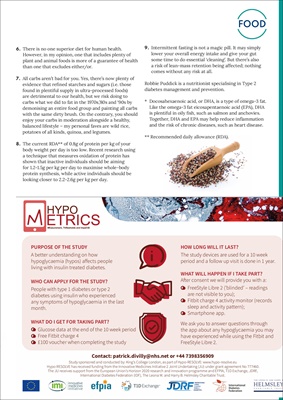
19
FOOD
PURPOSE OF THE STUDY
A better understanding on how
hypoglycaemia (hypos) affects people
living with insulin treated diabetes.
WHO CAN APPLY FOR THE STUDY?
People with type 1 diabetes or type 2
diabetes using insulin who experienced
any symptoms of hypoglycaemia in the last
month.
HOW LONG WILL IT LAST?
The study devices are used for a 10 week
period and a follow up visit is done in 1 year.
Contact: patrick.divilly@nhs.net or +44 7398356909
Study sponsored and conducted by: King's College London, as part of Hypo-RESOLVE: www.hypo-resolve.eu
Hypo-RESOLVE has received funding from the Innovative Medicines Initiative 2 Joint Undertaking (JU) under grant agreement No 777460.
The JU receives support from the European Union's Horizon 2020 research and innovation programme and EFPIA, T1D Exchange, JDRF,
International Diabetes Federation (IDF), The Leona M. and Harry B. Helmsley Charitable Trust.
WHAT DO I GET FOR TAKING PART?
Glucose data at the end of the 10 week period
Free Fitbit charge 4
£100 voucher when completing the study
WHAT WILL HAPPEN IF I TAKE PART?
After consent we will provide you with a:
FreeStyle Libre 2 ('blinded' - readings
are not visible to you);
Fitbit charge 4 activity monitor (records
sleep and activity pattern);
Smartphone app.
We ask you to answer questions through
the app about any hypoglycaemia you may
have experienced while using the Fitbit and
FreeStyle Libre 2.
6. There is no one superior diet for human health.
However, in my opinion, one that includes plenty of
plant and animal foods is more of a guarantee of health
than one that excludes either/or.
7. All carbs aren't bad for you. Yes, there's now plenty of
evidence that refined starches and sugars (i.e. those
found in plentiful supply in ultra-processed foods)
are detrimental to our health, but we risk doing to
carbs what we did to fat in the 1970s,'80s and '90s by
demonising an entire food group and painting all carbs
with the same dirty brush. On the contrary, you should
enjoy your carbs in moderation alongside a healthy,
balanced lifestyle - my personal faves are wild rice,
potatoes of all kinds, quinoa, and legumes.
8. The current RDA** of 0.8g of protein per kg of your
body weight per day is too low. Recent research using
a technique that measures oxidation of protein has
shown that inactive individuals should be aiming
for 1.2-1.5g per kg per day to maximise whole-body
protein synthesis, while active individuals should be
looking closer to 2.2-2.6g per kg per day.
9. Intermittent fasting is not a magic pill. It may simply
lower your overall energy intake and give your gut
some time to do essential 'cleaning'. But there's also
a risk of lean-mass retention being affected; nothing
comes without any risk at all.
Robbie Puddick is a nutritionist specialising in Type 2
diabetes management and prevention.
* Docosahexaenoic acid, or DHA, is a type of omega-3 fat.
Like the omega-3 fat eicosapentaenoic acid (EPA), DHA
is plentiful in oily fish, such as salmon and anchovies.
Together, DHA and EPA may help reduce inflammation
and the risk of chronic diseases, such as heart disease.
** Recommended daily allowance (RDA).